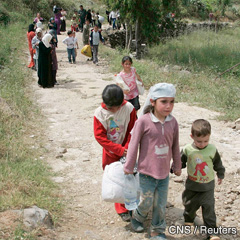"Everything is so expensive and there are no jobs," she said. "Lots of (migrants) come flocking to the church looking for help."
The sisters have been able to give out small amounts of cash and they have been distributing food and other supplies they receive from the office of the UN High Commissioner for Refugees via Tunisia, she said.
Foreigners began fleeing Libya in March when NATO forces began air strikes to quell a civilian uprising. While most immigrants have left the country, some are stuck in Libya or have chosen to stay.
"The majority of people who left were in Libya for only a short time or Libya was a transit country for them;" others were too frightened to stay or some had no money to stay on, Sister Shirley said.
Of the immigrants deciding to stay, many did so because they have been living in Libya for a number of years and are taking a "wait-and-see" approach, hoping the situation in the country improves, she said. Also, many of them have no home or work to return to in their country of origin, she explained.
Five religious communities — including the Missionaries of Charity and the Daughters of the Sacred Heart — are working in and around Tripoli.
The sisters at the Franciscan Missionaries of Mary community near Tripoli worked at a government-run home for the elderly or centres for education. Some sisters have been unable to continue their work because they need to use a car to get around, Sister Shirley said. Rising gas prices and shortages have made getting around extremely difficult.
All of the Catholics in Libya are foreign workers, said Sister Shirley, who is from India. The majority come from India, the Philippines, Ghana, Congo, Nigeria and Sudan, and some are from Europe.
Fr. Daniel Farrugia, a priest from Malta and vicar of the apostolic vicariate in Tripoli, told CNS that there had been some 100,000 Christians living in Libya before the conflict. Many of them have fled the city, but those who have stayed are usually the women working in the hospitals, he said.
{iarelatednews articleid="5255,5359,5311,5307,5282,5278"}
In Libya, religious continue to offer care, service to migrants
By Carol Glatz, Catholic News Service ROME - Despite the worsening crisis in Libya, religious women and men continue to offer pastoral care and desperately needed services to the country's many migrants.
ROME - Despite the worsening crisis in Libya, religious women and men continue to offer pastoral care and desperately needed services to the country's many migrants.
Many of the migrants who have stayed behind have lost their jobs and have nowhere else to go, which leaves them searching for food, medicine, clothing and most of all, rent money, said a nun working just outside of Tripoli.
Sister Shirley of the Franciscan Missionaries of Mary told Catholic News Service May 20 that the livelihood of many immigrants depended on the once-strong presence of diplomats, oil workers and other foreign professionals. After those professionals left, there was little to no work left for the lower-paid immigrant workers, she said.
Please support The Catholic Register
Unlike many media companies, The Catholic Register has never charged readers for access to the news and information on our website. We want to keep our award-winning journalism as widely available as possible. But we need your help.
For more than 125 years, The Register has been a trusted source of faith-based journalism. By making even a small donation you help ensure our future as an important voice in the Catholic Church. If you support the mission of Catholic journalism, please donate today. Thank you.
DONATE
